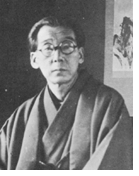

HISTORY OF HAIKU
10 haikuists and their works
Chapter 6
Ippekiro Nakatsuka (1887 ~ 1946)
 In the era of Meiji (1868 ~ 1912) and Taisho (1912 ~ 1926),
many writers tried to introduce the colloquial language into the traditional
literary style. Because the traditional language attached importance to
a lofty tone, it was very far away from the spoken language and was not
suitable to express modern ideas. The necessity of the unification was evident.
In the era of Meiji (1868 ~ 1912) and Taisho (1912 ~ 1926),
many writers tried to introduce the colloquial language into the traditional
literary style. Because the traditional language attached importance to
a lofty tone, it was very far away from the spoken language and was not
suitable to express modern ideas. The necessity of the unification was evident.
Haiku was so closely related to the traditional literary language that poets thought it was impossible to introduce the spoken style there. The 5 or 7 syllables which built each part of a haiku were based on the traditional style; in the spoken language, each part tends to extend up to 6 or 8 syllables.
Ippekiro Nakatsuka revolted against this general idea and he introduced the colloquial style into haiku. His haikus were released from the rigidity of 17 syllables and he initiated "the Free Form Haiku".
He also rejected the use of kigos (season words), and he questioned the usual operation of haiku magazines in which masters exerted a strong power. He advised haikuists to develop their personal style.
Today, everyone will be astonished at the novelty of Ippekiro's haikus.
They are neither mysterious nor pretentious, and they succeeded in presenting
the clear comprehension of essence of things and facts in a laconic style.
His haikus are not fixed form. They reproduce human spirits which flicker
like candle flames in their flexible sentences.
The image of me
Out of the mirror
Came to the chrysanthemums exposure.
Oh, my hand slips on the white hibachi,
Oh, my country.
* hibachi: earthenware brazier used indoors.
The wet nurse
Stopped looking at a bucket of sea cucumbers
And walked again.
A dog with a long flank is sad.
Rapes blossom.
Murmurs behind the cart of hay.
A summer day is coming.
May I be with my mother wearing summer kimono
By this window in the morning.
The granary is white
Sheltering all the harvested millet.
The baby came in the world with hair.
Daybreak.
In the field
Ears of dry-land rice fills it,
Taros too
Let hang their large leaves.
This is really a dilapidated house
Receiving a visitor
Under the burning sun.
Written by
Ryu Yotsuya
Next Page (Sekitei Hara)
HOME / Index
French / Japanese
e-mail to Ryu Yotsuya and Niji Fuyuno
loupe@big.or.jp